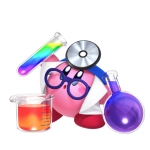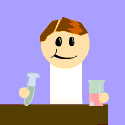|
Raman isn't a niche technique if I have anything I say about it
|
|
|
|

|
| # ? May 15, 2024 20:10 |
|
C-Euro posted:Thanks for the feedback, I'm just trying to put together a general resume right now as my GF's advisor apparently knows a guy with a young-ish green chemistry/organic chem company, so she's been on me to give her a resume this week to pass to her boss to maybe pass on? I'm not sure how comfortable I feel giving out a resume by going through so many people like that but worst-case scenario is that I get some critique on it. I don't really know what I want to do right now either, I'm only doing this because she's been so insistent that she/her boss can hook me up (again, not too sure about that but she's over-excited about it because the company is located such that we'd be living together). Since this is just a practice swing of sorts, should I list my advisor as a reference or just say "References available upon request"? Bottom line is to do research on the companies and tailor your resume to each specific posting by highlighting the most relevant techniques to that posting. What part of the country are you applying in?
|
|
|
|
FTIR and Raman are are starting to be used more and more at my company for real time monitoring of reactions. I helped develop a model that would take FTIR data in real time from a reaction, and predict the expected time for the reaction to reach completion so we could immediately quench the reaction. Needed to do it, because we would get too many impurities if we let the reaction run for the hour it would take for the analytical lab to get us results by HPLC.
|
|
|
|
As a research technician, I find that my day to day duties and responsibilities to be mundane, menial and repetitive. Though the results that my work produce do indeed manage to prevent further illness and ultimately save lives, I am seeking a more exciting and fulfilling career. Are there any people who are in the same position and/or have been in this position and are looking for better work? Did you find it? What did you do after? Any suggestions on how to jump from research support to something more in the healthcare industry?
|
|
|
|
majestic12 posted:Raman isn't a niche technique if I have anything I say about it Raman is really cool, a lot of the developing applications I've seen have been using it to look at biomolecules. But there's loads of other things you can do with it - I've seen stuff as varied as looking at retired aircraft frames to determine the composites they're made of, and some real-time stuff like gnin mentioned.
|
|
|
|
bakersk8r6301 posted:As a research technician, I find that my day to day duties and responsibilities to be mundane, menial and repetitive. Though the results that my work produce do indeed manage to prevent further illness and ultimately save lives, I am seeking a more exciting and fulfilling career. Go to sales It's the best Go to sales It's the best (Say what?) Go to sales It's the best It's the best It's the best
|
|
|
|
Sales really is the best. But in the meantime while I'm out of the game I am still a technical trainer for one of the top three LIMS vendors. If anyone has any questions about LIMS (or has a strong LIMS background and wants a job) feel free to ask.
|
|
|
|
Screw sales and go into quality. Then you can change fields all together and work on amazing poo poo like this:  That's a 787-9, not a -8, so I don't want to hear a loving thing about batteries, understand? Solkanar512 fucked around with this message at 04:37 on Feb 4, 2013 |
|
|
|
bakersk8r6301 posted:As a research technician, I find that my day to day duties and responsibilities to be mundane, menial and repetitive. Though the results that my work produce do indeed manage to prevent further illness and ultimately save lives, I am seeking a more exciting and fulfilling career. I have had a lot of the same feelings. Being a tech is interesting but unfulfilling. I don't want to get a PhD because I'm not interested in the types of jobs a PhD leads to and I don't think the lifestyle is for me. It's kind of a hard spot because I do enjoy research but don't want to remain a tech and don't want to move on to grad school. After auditing my boss's pharmacokinetics class and loving it, I decided to apply to pharmacy school and am currently in the middle of the process. There is a lot you can do with a PharmD, including research, and you can have more of a 9-5 schedule and get paid well. I've been getting involved with the clinical research group at the local hospital and have been shadowing during the clinical studies. I'm also working on a research protocol for a pharmacokinetics study based on a rare P450 variant my lab found in a Native American population. I don't know if pharmacy school has been on your radar, but if it hasn't it might be worth looking into.
|
|
|
|
Aromatic Stretch posted:Raman is really cool, a lot of the developing applications I've seen have been using it to look at biomolecules. But there's loads of other things you can do with it - I've seen stuff as varied as looking at retired aircraft frames to determine the composites they're made of, and some real-time stuff like gnin mentioned. We did a bit of work with the archivists at our university's library to determine the age of some old cookbooks and journals they had (17th-century stuff), and we were using Raman and looking at the ink to do so. I don't remember a lot of the details but my boss was really excited about it for a week or two. I've also heard of the development of ranged Raman microscopes/detectors that can work up to several feet away from a sample. I wouldn't mind getting a job making crazy instrumentation like that, my girlfriend's always said I should get into engineering.
|
|
|
|
who cares posted:I have had a lot of the same feelings. Being a tech is interesting but unfulfilling. I don't want to get a PhD because I'm not interested in the types of jobs a PhD leads to and I don't think the lifestyle is for me. It's kind of a hard spot because I do enjoy research but don't want to remain a tech and don't want to move on to grad school. I havent actually thought about it, but after doing some research into it, it definitely sounds like an interesting field. Thanks for the heads up!
|
|
|
|
Anyone else going to Pittcon this year? It's my first time going this year. Who's got the best swag and best new instruments? I'm trying to convince my boss (and his boss) that I need a TGA-FTIR.
|
|
|
|
My company will be there and I live in Philadelphia so I'm going to see if I can make it in for a day or two if we have extra passes. Even if I don't I'd be down for meeting up in Philly if you'll be in town and bored.
|
|
|
|
who cares posted:I have had a lot of the same feelings. Being a tech is interesting but unfulfilling. I don't want to get a PhD because I'm not interested in the types of jobs a PhD leads to and I don't think the lifestyle is for me. It's kind of a hard spot because I do enjoy research but don't want to remain a tech and don't want to move on to grad school. Are any of the non-retail fields developing right now? I was pre-pharmacy a few years ago, and from what I gathered the non-retail jobs were few and far between. Maybe I was just benighted at the time because I spent two years as a pharm tech. Now here I am looking into it again, because having a bachelor's in chem sucks.
|
|
|
|
carnassials posted:Are any of the non-retail fields developing right now? I was pre-pharmacy a few years ago, and from what I gathered the non-retail jobs were few and far between. Maybe I was just benighted at the time because I spent two years as a pharm tech. I'm going to sound like a broken record here but QC/QA is not a terrible field to go into. Yes, being a rules lawyer and handling/signing documentation isn't the most glorious of jobs out there, but it's a field that isn't something many folks pursue. I landed in that field by accident to be honest. You still get to use your skills, but in a different way and you gain experience that can apply to just about any industry that makes something. Sure, you have to be an anal-retentive rear end in a top hat, but the rear end in a top hat part is at your discretion.
|
|
|
|
Does anyone have any advice for a PhD/MBA grad? I got my PhD in life sciences and am currently doing a full-time MBA in Toronto and looking for summer internships. I had hoped to go into pharma and work at the interface between the R&D and the financial side, but there doesn't seem to be much demand and now im at a loss at where I should direct my efforts.
|
|
|
|
Have you looked at sourcing groups? They are the people that deal with vendors that make the starting materials we use for processing. It's not the straight financial side, but I know a couple people in our group, and a few of them went out for MBAs. They have to know (in our case) chemistry in order to be able work with project teams on creating RFPs, and need to review contracts and such with vendors. They also help manage the interface between the vendor and the project team if there are issues with the chemistry when they scale up. They tend to get more involved in the financial side of the R&D groups, as they are more directly dealing with budgets. I would imagine there's something similar for biologics that could make use of a life science background. Edit: There are also virtual companies, that buy assets from other companies, and then manage the scale-up and initial testing of compounds purely through contract vendors. They basically exist to try and get compounds through Phase II and into Phase III to try and essentially flip compounds to bigger pharmaceutical companies. I worked on a compound that we ended up selling to one of these companies, so I had to transfer some work to them. Talking to the guys at the company, it seemed like a cool job - requires a lot of travel. They required a combination of science and business in order to function, as they didn't own any internal R&D capability. Needed to be able to evaluate other companies, assets, etc. gninjagnome fucked around with this message at 00:19 on Feb 12, 2013 |
|
|
|
Reading this thread has been great, since I have no experience with the industry side of things. It's been eye-opening, for sure. I recently graduated with a very weird degree: The concentration was Applied Biology and Biotechnology within a Plant, Soil, and Insect Sciences department. Basically I spent my time studying molecular biotechnology and genetics as well as old school plant breeding (soil health, plant physiology, etc.). Right now I am waiting to hear back on my acceptance into a PhD program in Genetics, looking specifically at plant genetics/plant breeding. However, I am unsure of how marketable this degree would be. I am also looking at a Designated Emphasis on Biotechnology program in conjunction with the PhD. The DEB program is nice because it includes an internship as part of the program, to gain industry experience. I am basically going to grad school to work on new crop varieties that will benefit third-world farmers, and I understand there is little money in that, which is fine for the duration of the PhD. After the degree though, I would like to switch over to industry and make quite a bit more money. I am NOT interested in living in the middle of agricultural nowhere, and I am not interested in working for Monsanto (other companies may be a different story). Am I being an idiot? Should I pursue a different concentration during the PhD in cancer or human genetics? Which facet of genetics is the most well-funded/stable?
|
|
|
|
I feel like there's a more general thread for this sort of question, but since I'm interested in chemistry/science jobs I'll ask here: Is it worth it to apply for positions that you know you're not qualified for, or to give resumes to companies that don't list any positions you might be qualified for? For example, I'm looking at listings and I saw a job that requires a Bachelor's in Chemical Engineering, but I'll have (or be close to having) a Master's in Chemistry by the time I'd start such a job. Does it depend on the responsibilities of the job, or do employers adhere to these sorts of guidelines more strictly? As to the second point, my GF has a friend at a chemical company and insisted that I send a resume to her (to distribute in said company), even though all the job openings on their website had requirements that I didn't meet. I did give her a resume, but should I hold out hope that anything comes of it? Again there weren't any listings that I qualified for, but I figured that if I can give a resume directly to someone in the company then I might as well go for it. In the future though, is it worth it to send out resumes to places where I know (or it appears that) I'm not qualified?
|
|
|
|
C-Euro posted:I feel like there's a more general thread for this sort of question, but since I'm interested in chemistry/science jobs I'll ask here: Is it worth it to apply for positions that you know you're not qualified for, or to give resumes to companies that don't list any positions you might be qualified for? I doubt it will be worth it to apply for positions that you don't qualify for through web sites - for the most part, it's just gonna be filtered out. If you can get your resume into a someone's hand, you probably stand a better shot if you can at least talk to someone about a potential fit despite the differences. On the other hand, if you have a contact that's willing to take your resume. You have a better chance. There's a chance that there are positions that may not have been public posted yet. My company usually post internally for a month or so before we post publicly, but we'll take referrals from employees during that time period.
|
|
|
|
heliotroph posted:Reading this thread has been great, since I have no experience with the industry side of things. It's been eye-opening, for sure. I recently graduated with a very weird degree: The concentration was Applied Biology and Biotechnology within a Plant, Soil, and Insect Sciences department. Basically I spent my time studying molecular biotechnology and genetics as well as old school plant breeding (soil health, plant physiology, etc.). Right now I am waiting to hear back on my acceptance into a PhD program in Genetics, looking specifically at plant genetics/plant breeding. However, I am unsure of how marketable this degree would be. I am also looking at a Designated Emphasis on Biotechnology program in conjunction with the PhD. gninjagnome posted:I doubt it will be worth it to apply for positions that you don't qualify for through web sites - for the most part, it's just gonna be filtered out. If you can get your resume into a someone's hand, you probably stand a better shot if you can at least talk to someone about a potential fit despite the differences.
|
|
|
|
Dik Hz posted:Syngenta here in North Carolina is pretty much always hiring. I hear it's a decent company to work for. True, but the questions seemed to be geared much further towards not having any qualifications for, versus missing a couple things. Especially because his example was major, which I feel is one area you can't fudge. It's also a huge pet peeve of mine, because I recruit for one of the chemical engineering groups at my company, and toss about 2/3 of the submitted resumes because there electrical or bio engineering or something completely out of left field like psych or finance. For a first job out of school, I'd apply if you fit the major, degree requirements. gninjagnome fucked around with this message at 02:55 on Feb 14, 2013 |
|
|
|
C-Euro posted:I'm looking at listings and I saw a job that requires a Bachelor's in Chemical Engineering, but I'll have (or be close to having) a Master's in Chemistry by the time I'd start such a job. Does it depend on the responsibilities of the job, or do employers adhere to these sorts of guidelines more strictly? Seconding gninjagnome, but if you'll ultimately get away with it depends a lot on the job responsibilities, e.g. whether they're looking for a mechanical or process engineer who understands basic chemistry or vice versa. plasmoduck fucked around with this message at 01:49 on Feb 16, 2013 |
|
|
|
plasmoduck posted:Seconding gninjagnome, but if you'll ultimately get away with it depends a lot on the job responsibilities, e.g. whether they're looking for a mechanical or process engineer who understands basic chemistry or vice versa. It's complicated further by the fact that most job postings are inaccurate to at least some degree because they're (a) written or at least embellished by HR who have no idea what they're talking about, (b) recycled from the last time the job was posted because the hiring manager is too lazy and/or incompetent to come up with something new, or (c) just plain inaccurate to make a job seem more appealing. (c) is the worst and most dishonest. For example my current position REQUIRED 5 years of experience in GC and UV-Vis work and during the interview the quality director told me they had neither of those instruments. At least she was honest and told me the posting was slapped together by HR. Generally you won't hurt yourself or your career even if it kind of seems like a long shot (unless you're completely clueless, like applying to be a R&D director fresh out of school). But you do risk wasting your own time. If you can write a decent cover letter in response to a job posting it's generally worth a shot. If you're struggling for half an hour to describe how your background applies to the posting then you're probably wasting your time. It gets easier as you get experience and develop your skills and especially connections. I'm an analytical chemist with absolutely no chem-E education but after working here for a year have had our R&D department try to recruit me in as a process scale engineer and train me on the job. The money's better, I just don't find it interesting, but am glad to have that option. quote:Landed in QC/QA by accident  seacat fucked around with this message at 03:57 on Feb 16, 2013 |
|
|
|
Solkanar512 posted:I'm going to sound like a broken record here but QC/QA is not a terrible field to go into. Yes, being a rules lawyer and handling/signing documentation isn't the most glorious of jobs out there, but it's a field that isn't something many folks pursue. I landed in that field by accident to be honest. Sorry if I derailed that with my complaining. I've actually recently switch my job search to primarily qa/qc positions. I'm currently working as a "Process R&D" chemist aka column slave and everyday the thought of working at a desk pushing paper and giving lab chemists hell gets more and more appealing. Do you guys have any tips on looking for and applying for these positions? It seems like it would be great if I had GMP experience to play up, but none of my projects have gone that way yet.
|
|
|
|
carnassials posted:Sorry if I derailed that with my complaining. I've actually recently switch my job search to primarily qa/qc positions. It's kind of weird to hear someone want to get into quality from R&D, almost everyone I've worked with seem to want to go the other way.
|
|
|
|
Lyon posted:Sales really is the best. But in the meantime while I'm out of the game I am still a technical trainer for one of the top three LIMS vendors. What kind of work do you do? I'm looking to get out of the lab and find my niche in IT and/or the more technical behind the scenes work of life sciences/healthcare. I'm located in NYC if you happen to know of any openings?
|
|
|
|
bakersk8r6301 posted:What kind of work do you do? I'm looking to get out of the lab and find my niche in IT and/or the more technical behind the scenes work of life sciences/healthcare. I'm located in NYC if you happen to know of any openings? We are a software company that sells Laboratory Information Management Systems. I'm not sure how much interaction you've had with LIMS software in your career but if you aren't sure what that means then the easiest description is that the primary, or at least initial, function of a LIMS is sample management. Track the sample from its creation, through all of the testing/results entry, and finally to its disposal. You are left with a permanent virtual record of your sample and the results of your testing that is easily retrievable in case of any regulatory audit, comparison, etc. One of our goals is to make labs more automated, "paperless", and efficient. There is a ton of functionality beyond that, a LIMS is basically an ERP/MRP specialized for the lab but for simplicity's sake you can think of it as a big sample management system. If any of that sounds interesting to you and you have the required IT/tech skills we are pretty much always hiring Business Analysts to interface between the customer and our development staff. Feel free to contact me on gmail, username is ecksile.
|
|
|
|
Hey all, I've loosely skimmed the first ten pages of this thread and the last couple; I didn't see much on this subject so I'm gonna ask, sorry if it's a repeat. I'm looking into medical lab technician associates degrees. Are these legit/lead to decent careers? I noticed mentions of medical laboratory scientists and the difference seem that appears to be a bachelors degree, but roughly the same thing? I've already got a bachelors degree (BA dual major in English/ geography) so I'm a bit hesitant to jump back into another 4yr degree particularly since I don't think a lot of my classes carry over to that type of degree. I'm currently a lab tech in an industrial oil testing lab (1 & 1/2 years), but I can see that upward mobility in this area is really limited to specific DGA chemists or management. I don't want management, I like working in labs and would love to just be a lab tech for my career as long as the pay was good (it's not here). Really, I'm just trying to explore other options that still allow me to be a lab tech without committing to pretty much getting a whole second BA/BS. Anyone have any ideas? Would I have much range to move up in labs if I get a medical lab tech assoc. degree while also still having a BA? Or would getting an assoc degree just land me in the same kind of area without any pay advances or promotions?
|
|
|
|
I would think that your best bet would be to either stay where you are until you have several years work experience, which generally seems to be the main thing that companies want for any kind of lab work regardless of education level. That's assuming you're doing things that give you useful skills and are not just a glorified lab monkey who moves things from one place to another place (it's me I am the monkey). Alternatively, I would think that having enough work experience plus a bachelor's of any type would be enough to at least get you considered for a master's program. Might be worth contacting some programs to get a feel for their requirements. On an unrelated note, I made an environmental science thread if anybody is into that sort of thing: http://forums.somethingawful.com/showthread.php?threadid=3536914
|
|
|
|
seacat posted:What industry are you in, pharma? My knee jerk reaction is that'd you'd have to start as a lab monkey to get into a desk job in quality, if you don't have significant experience with GMP, OOS investigations, document control, change control, CAPA programs, etc. But it also depends on your education and experience. We've had a quality director and a quality engineer get pushed out and laid off respectively because they got hired without being qualified... you definitely don't want to be in that position. I'm in a small pharmaceutical company. I really don't mind working as a lab monkey as long as I can progress and I can pay my bills/debt. Where I am now I don't make 35k and there's no room for growth. I could have a good deal of GMP experience from the R&D side over the next couple of months but that project hasn't started yet. My immediate plan is to keep sending off cover letters and resumes. I'm also looking into grad school. I really don't think a PHD is for me; I have no outstanding enthusiasm for chemical research and I don't want to spend another 5 years in school. I've been doing some research into chem eng masters which looks like it would take a year of undergrad engineering crash coursing before I could start, but it sounds intriguing. Is there any other options that play off of my chemistry bs (3.8 GPA, good state school), and undergraduate research other than med school, pharma school, or bio/chem PHD's? I'm not money hungry I just want to be able to make like 60k before I'm 30 and maybe like 120k before I'm 70. I just want a stable career where I can apply my technical skills and knowledge of science and math.
|
|
|
|
Where do you live, and assuming it is somewhere that is not a biotech/pharma hub, are you willing to move to one? Getting more than 60k by 30 with a BS is a pretty achievable (though costs of living changes might not make it worth while). Upward mobility is dependent on the company, in some with a BS you can move straight into PhD roles with enough experience if you have shown you know what you are talking about, in others there is a hard cap where once you obtain whatever max title is for someone with a BS, you are stuck there forever. The largest company I worked for was the latter, after about 10 years experience you would reach the highest role and be stuck there. I knew a lot of people who did the minimum required to not get fired just because there was no incentive to do anything more than that.
|
|
|
|
I live in bumfuck SC and went to school in Alabama. I'd be willing to relocate anywhere, unless you mean move there without a job offer and in that case I don't know if I have the finances to do that. Yeah, I also realized even if I get paid like 60 or 70k I would still be limited by my education. So I figured I might as well look into my education options while I'm still young.
|
|
|
|
I know you're leaning away from such programs, but as someone currently in the process of leaving his chemistry PhD program early, do not under any circumstances go into a chemistry PhD program unless you find research that A) you are in love with, and B) will be there for at least a few years. The only jobs that require a doctorate are tenure-track professorships at universities, and it doesn't sound like you're too interested in those. I'm in the job hunt right now and I can tell you that many positions have a sliding degree+experience scale, for example a posting might list the following requirements: PhD in Chemistry and 0 years work experience OR MS in Chemistry and 3 years work experience OR Bachelor's in chemistry and 6 years work experience So for an industry posting, experience at a previous job (especially if it involved a similar skillset) will make up for a less advanced degree. And from what I've seen having a BS/MS can sometimes be more desirable for hiring as you command a lower salary right out of the gate. I had a couple of friends leave my program with Master's degree last spring, and both only spent 2-3 months looking for jobs which they currently still hold; meanwhile a guy in my lab got his PhD in December '11, then needed an entire semester to find a job that he lost after three months when his funding was cut (it was a weird postdoc/national lab mashup position), and now he's working a job that could be done with an MS. I'll admit I'm on something of an anti-grad school kick right now but do not pursue a PhD solely because you think you need one. Do it if you want one. (plus if you want to get paid you just have to know where to look. I found a chemistry job at a power plant that only required a GED, and the starting salary was $30/hour(!). Fingers loving crossed on that one VV Yeah, my jaw hit the floor when I saw it. They actually listed $30-$35/hour as the starting salary, which would be triple my current pay for 2/3 of the hours I currently work. Too bad they'll probably pass over my resume due to being "overqualified" 
C-Euro fucked around with this message at 02:01 on Mar 12, 2013 |
|
|
|
C-Euro posted:(plus if you want to get paid you just have to know where to look. I found a chemistry job at a power plant that only required a GED, and the starting salary was $30/hour(!). Fingers loving crossed on that one Wow. I have a PhD in Chemistry and I don't make $30 an hour even if you pretend I worked only 40 hours a week!
|
|
|
|
Naffer posted:Wow. I have a PhD in Chemistry and I don't make $30 an hour even if you pretend I worked only 40 hours a week! Power plant chemistry jobs, particularly at nuclear plants, are very well paid indeed. I'm a chemist at a nuclear generating station. The chemistry technicians who work for me get hired in at about $33 an hour for the duration of their training. Training lasts about 18 months; when a technician is fully qualified their pay increases to about $44 an hour. My plant is a union plant, so the technicians get guaranteed annual raises and employment security along with awesome benefits. Counting overtime, the average fully qualified technician at my plant made very close to $100k last year. The official job description for nuclear chemistry technicians was written back in the 60s and hasn't been much updated since then; back then they really didn't think they needed to hire college graduates for the job. While the postings often still list "high school or GED", it is the policy of my company, which is one of the largest nuclear operators in the US, to hire only people with at least one of the following: 1) BS in chemistry, biology, physics, math, or engineering, or 2) 4+ years of lab experience or 3) US Navy service as an Engineering Laboratory Technician. Advanced degrees are NOT a disqualifier; we don't believe in "overqualified". Please feel free to PM me if you have questions about landing a job in or working in nuclear power plant chemistry. Edit: Oh hey, look at that, we're hiring: http://careers.exeloncorp.com/job/Byron-Chemistry-Technician%2C-Byron-Station%2C-Byron%2C-IL-Job-IL-61010/2409230/ (not at my plant, another in our fleet) Ossetepo fucked around with this message at 12:03 on Mar 12, 2013 |
|
|
|
Ossetepo posted:Power plant chemistry jobs, particularly at nuclear plants, are very well paid indeed. I'm a chemist at a nuclear generating station. The chemistry technicians who work for me get hired in at about $33 an hour for the duration of their training. Training lasts about 18 months; when a technician is fully qualified their pay increases to about $44 an hour. My plant is a union plant, so the technicians get guaranteed annual raises and employment security along with awesome benefits. Counting overtime, the average fully qualified technician at my plant made very close to $100k last year. C-Euro fucked around with this message at 19:18 on Mar 12, 2013 |
|
|
|
I think a lot of us would be curious about what kind of job that is, so if one or both of you could talk about it that would be cool.
|
|
|
|
Any of you R&D goons worked for a company under FDA consent decree? I've worked under one in manufacturing (it sucks), but I'm curious how much it affects R&D / scale-up day-to-day activities. Figuring out which ship sinks faster: career planning at its finest. 
|
|
|
|

|
| # ? May 15, 2024 20:10 |
|
Sundae posted:Any of you R&D goons worked for a company under FDA consent decree? I've worked under one in manufacturing (it sucks), but I'm curious how much it affects R&D / scale-up day-to-day activities. Is it a recent consent decree? My company got out of one a few years back, but apparently that's extremely rare. Most places, especially smaller ones, end up going under because of the cost of bringing everything up to code, paying third parties for review, etc. I'm not in R&D, but I'd assume that's one of the first areas to suffer.
|
|
|







 ). No real experience on GC/MS though unfortunately
). No real experience on GC/MS though unfortunately 








 You are receiving this broadcast as a dream...We are transmitting from the year one nine... nine nine ...You are receiving this broadcast in order t
You are receiving this broadcast as a dream...We are transmitting from the year one nine... nine nine ...You are receiving this broadcast in order t

